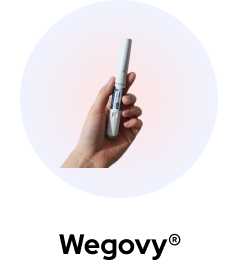Well, according to multiple studies and real-world users, Ozempic can not only be a game changer when it comes to type 2 diabetes management, but also weight management, and overall health improvements.
Of course, the most effective way to see this is from before and after anecdotal information and images. In this article we’ll look at:
- What Ozempic is
- Real-life before and afters of Redditors who have used Ozempic
- Case studies of situations pre-Ozempic
- What happens during your Ozempic treatment
- What to do after you complete your Ozempic treatment
- The potential long-term benefits of Ozempic
- The potential complications following Ozempic treatment
- Frequently asked questions.
Ready to get into it? Let’s go!
What Is Ozempic?
Ozempic is the brand name of semaglutide, marketed by Novo Nordisk. You may also see it marketed as Wegovy or Rybelsus. Though it was originally developed for the treatment of type 2 diabetes, it is also available on prescription to those with a BMI over 27 to assist weight management.
Additionally, semaglutide can assist with the reduction of cardiovascular health risks, including heart attacks, stroke, high blood pressure, and death.
According to this 2020 study, semaglutide greatly improved participants’ health-quality of life, along with improved A1C compared to placebo group. This 2022 study also showed a significant reduction in mass index and waist circumference, comparative to bariatric surgery results.
Those who are prescribed Ozempic as part of a weight loss plan will also need to make lifestyle changes in order to maximize their results. This includes implementing a healthy diet, regular exercise, and potentially therapy into their routine.
There are currently no known shortages of semaglutide in Canada. However, it’s important to note that unless you have been prescribed it for the treatment of type 2 diabetes, your health insurance will unlikely cover the cost of the drug, which may limit your access to it.
How Does Ozempic Work?
Ozempic is a GLP-1 (Glucagon-Like Peptide-1) agonist, which means that it mimics the effects of the GLP-1 hormone in your body. This hormone is involved in blood sugar and appetite regulation.
When Ozempic is injected into your body, it slows down the rate of digestion and gastric emptying, helping to keep you feeling full longer. This can lead to a decrease in food intake and subsequent weight loss.
Semaglutide also works to control blood sugar levels and suppress feelings of hunger in the brain. The combination of these factors makes it a promising treatment for weight management, especially when combined with other lifestyle changes.
Ozempic Before and Afters from Reddit
There is a thriving Reddit community of people who are using Ozempic for weight management, where people share their experiences and ask for advice.
Here are just some of the many before and after stories on the Ozempic Subreddit:
- One male Redditor lost a stunning 116.5 lbs after a year on Ozempic
They combined using Ozempic with a calorie-restricted diet and exercise regime, and were able to continue losing weight even once they finished taking the medication.
- A female Redditor shared that they lost 40 lbs in 5 months on Ozempic, dropping from 195 to 155 lbs
They shared that prior to the drug, they had done everything they could to shed the weight on their own, without success.
- Another Redditor dropped from 222 to 174 lbs and said that Ozempic “literally changed my life”
She had some side effects to start with, but these dissipated as her body adjusted to the medication.
Situation Before Starting Ozempic
Not just anyone can start using Ozempic. As a prescription medication, you’ll need to either be using it to help manage type 2 diabetes, or have been prescribed it for weight management if you have a BMI over 27.
Conditions and Eligibility
In Canada, Ozempic is approved by Health Canada for those who have type 2 diabetes or are considered to have obesity (ie, have a BMI over 27).
Your medical team will talk to you about the efforts you’ve made to lose weight previously, as well as make sure you don’t have any issues that would make Ozempic unsafe for you.
In addition to there being a number of contraindications which may affect semaglutide, there are also some personal health concerns which would disallow you to commence Ozempic.
For example, if you have a personal or family history of pancreatitis or thyroid tumors, are allergic to semaglutide or any of the other ingredients in Ozempic, are pregnant or attempting to conceive, you should not take Ozempic.
Be sure to talk to your medical team about any and all prescription medications you’re taking, as well as vitamins and supplements.
Preparation
Before starting Ozempic, make sure you’ve learned everything you can about the drug so you have a thorough understanding of how it works. You’ll need to read about the dosage, how to administer it, and what to do to ensure you get the best possible results.
If you have any questions, get in touch with your medical team.
Possible Side Effects
Like any medication, Ozempic comes with possible side effects.
The most common of these include:
- Nausea
- Diarrhea
- Constipation
- Stomach discomfort.
Other effects may include:
- Decreased appetite
- Headache
- Fatigue.
Serious but rare side effects include:
- Hyperglycemia
- Changes in vision
- Kidney problems
- Pancreatitis
- Thyroid cancer.
If you’re experiencing any symptoms of the more serious side effects listed above, stop your Ozempic use immediately and get in touch with your medical team, or go directly to the ER at your local hospital.
Risks & Benefits
Due to the possible side effects, it’s essential to weigh up the possible risks versus the benefits.
One of the side effects of Ozempic is that it can help to manage your appetite, reduce cravings, and food intake. The benefit of this is that it may lead to a reduction in BMI and assist with weight management, especially when paired with a healthy diet and regular exercise.
It also helps to control blood sugar levels, which is essential for those with type 2 diabetes. Losing weight may also reduce cardiovascular health issues related to weight, including heart attack, stroke risk, and high blood pressure.
However, the major risks include the above listed side effects, so it’s essential to consider whether the potential benefits outweigh these.
Either way, be sure to talk to your medical team if you’re considering starting Ozempic, as they’ll be able to give you further advice and put a treatment plan in place.
Discussion with Healthcare Provider
A comprehensive discussion with your medical team before beginning treatment is essential.
You should discuss:
- Your medical history
- Weight goals
- Current medications you are taking, such as insulin or Metformin
- Your lifestyle habits.
Your medical team will be able to explain how the drug works, how to take it, and the possible side effects. You’ll also need follow-up appointments to monitor how the drug is working for you, and to adjust your dose.
Lab Tests Pre-Treatment
Prior to starting Ozempic, your doctor may order several lab tests. These can include:
- Blood sugar levels
- A1C
- Kidney function
- Others to establish a baseline and identify any potential concerns that could affect your treatment.
Regular lab tests may also be part of your ongoing treatment to monitor the drug’s effectiveness or side effects, and adjust dosage or treatment as necessary.
Lifestyle Changes Recommended by Healthcare Provider
While Ozempic can be used as an effective tool in weight management for those with a BMI of 27 or over, it needs to be combined with lifestyle changes to be effective.
A low-sugar, high-fiber diet is an excellent start, as is incorporating regular exercise into your routine. Monitoring the calories in your food may be helpful for you to keep track of your progress. However, we would exercise caution if doing so, as it’s easy to become overwhelmed and too focused on the numbers.
Therapy or counseling can be helpful in making sure you’re approaching your weight management with a healthy mindset, and may also help you with lifestyle habits. This will ensure that you get the most benefit possible out of your Ozempic treatment.
During Treatment With Ozempic
When you’re being treated with Ozempic, there’s a lot to keep track of. In addition to administering and managing your dosage and side effects, you’ll also need to keep checking in with your medical team, and monitoring your overall health.
Here are a few other things you should bear in mind.
Dosage Instructions and Frequency of Injections
Ozempic is taken in injectable form, once a week. These injections are self-administered with an Ozempic Pen (similar to an EpiPen).
You’ll usually start on a dosage of 0.25mg per week for the first 4 weeks, then move up to 0.5 mg per week, which you’ll maintain for the duration that you continue to use Ozempic. The maximum dose you may be placed on is 2mg.
Your medical team will assess you to see if you need any further adjustments.
Monitoring of Blood Glucose Levels
If you have type 2 diabetes, you will need to regularly monitor your blood sugar while on Ozempic. This will help you observe the impact the drug is having on your body, and make you more aware if dosage adjustments are needed.
Managing Side Effects
Common side effects such as nausea, diarrhea, constipation, and headaches can occur when taking Ozempic. Over-the-counter medicines may help manage these symptoms. However, you should always consult your medical team before taking any additional drugs.
For severe or persistent side effects (which we’ve listed above), immediate medical attention should be sought — either contact your medical team, or go directly to the ER at your local hospital.
Drinking plenty of water, eating smaller meals, and getting ample rest may also help manage minor side effects.
How does Ozempic work for weight loss?
The drug works by enhancing the effects of GPL-1. This hormone affects your appetite and hunger, as well as your stomach’s satiety and fullness.
Regular Check-Ups With Healthcare Provider
Regular check-ups are essential when using Ozempic.
Your medical team will assess your weight management progress, monitor your blood sugar levels, and talk with you about any side effects you might be experiencing.
Adjustments to Dosage as Necessary Based on Results
Your dosage of Ozempic may need to be adjusted based on your response to treatment.
Reasons for adjusting your dosage amount include:
- Changes in body weight
- Blood glucose levels
- Side effects.
After Ozempic Treatment
Once you complete your course of Ozempic and reach your goals, it is essential to maintain a healthy lifestyle in order to maintain your weight loss.
This includes following a healthy and balanced diet, getting regular exercise, and continuing to monitor blood sugar levels and manage your weight.
Follow-Up Visit With Healthcare Provider
After completing Ozempic treatment, a follow-up visit with your medical team is crucial. This appointment allows your provider to assess your overall health, review any lingering side effects, and evaluate the long-term impact of the medication on your blood glucose levels and BMI.
Your medical team may also provide advice on your weight management, recommend further treatments if necessary, or suggest lifestyle modifications to maintain your health improvements.
Ozempic Before and After Photos
It’s all well and good hearing about the benefits of Ozempic, but what about some concrete evidence of the results?
Thankfully, there’s plenty of before and after pictures available on the Internet, allowing you to see for yourself what kinds of results to expect from Ozempic treatment.
This article shares the photos and stories of three women who found Ozempic helpful for reaching their weight goals, and there are also many before and after photos available on Reddit.
What Long-Term Benefits Can I Expect from Ozempic Treatment?
Primarily, the long-term benefits of Ozempic for those with type 2 diabetes is better control over their glucose regulation and overall metabolic health. It may also reduce the risk of serious cardiovascular events.
If you’re taking Ozempic for weight management, then this could significantly reduce your risk of developing cardiovascular issues such as type 2 diabetes, high blood pressure, stroke, heart attack, or death.
Potential Complications After Using Ozempic
As discussed, there are several unpleasant side effects you may experience while on Ozempic. In some cases, it can also lead to pancreatitis, kidney damage or failure, changes in vision, and thyroid cancer. Additionally, the risk on unborn babies is still relatively unknown.
If you have lost a significant amount of weight while on the drug, you may also risk rebound weight gain if you’re unable to maintain lifestyle changes developed while on Ozempic. This, in turn, may lead to higher risk of cardiovascular disease.
It’s essential that you continue to communicate with your medical team, even after treatment has stopped, so that you can keep monitoring your overall health.
Key Takeaways
Ozempic is an extremely successful prescription medication in the treatment of type 2 diabetes, and for weight management of those with a BMI above 27. However, it’s essential to discuss the medication with your medical team before deciding upon it as a course of action.
Regularly monitoring your weight, side effects, and blood glucose levels is important for anyone taking Ozempic, as that will inform your medical team about key elements of your treatment. This includes your dosage, as well as duration of treatment.
As a tool for weight management, patients using Ozempic should pair the drug with a healthy diet and regular exercise, even when you’ve finished your course of treatment. As a general rule of thumb, losing two pounds a week is a good goal to aim for, and considered both safe and sustainable.
Upon completion of your Ozempic treatment, maintaining healthy lifestyle changes is crucial to long term success. Continue to communicate with your medical team to ensure that your long-term goals are met and your health plan is overseen by a professional.
Ozempic Before and After FAQs
Does Ozempic help you Manage Appetite?
One of the side effects of Ozempic is that it can help to manage your appetite, reduce cravings, and food intake. The benefit of this is that it may lead to a reduction in BMI and assist with weight management, especially when paired with a healthy diet and regular exercise.
It also helps to control blood sugar levels, which is essential for those with type 2 diabetes. Losing weight may also reduce cardiovascular health issues related to weight, including heart attack, stroke risk, and high blood pressure.
Is Ozempic helpful for weight management?
Though it was originally developed for the treatment of type 2 diabetes, it is also available on prescription to those with a BMI over 27 to assist weight management.
Additionally, semaglutide can assist with the reduction of cardiovascular health risks, including heart attacks, stroke, high blood pressure, and death.
According to this 2020 study, semaglutide greatly improved participants’ health-quality of life, along with improved A1C compared to placebo group. This 2022 study also showed a significant reduction in mass index and waist circumference, comparative to bariatric surgery results.
Those who are prescribed Ozempic as part of a weight loss plan will also need to make lifestyle changes in order to maximize their results. This includes implementing a healthy diet, regular exercise, and potentially therapy into their routine.
If you have lost a significant amount of weight while on the drug, you may also risk rebound weight gain if you’re unable to maintain lifestyle changes developed while on Ozempic. This, in turn, may lead to higher risk of cardiovascular disease.
How soon can I see results from Ozempic?
There is no one size fits all answer on how quickly you’ll see results. Some people find it affects them instantly, others take a few months before they begin to reach their weight management goals. Most, however, report that they see results within a few weeks.
How fast can I lose weight with Ozempic?
There is no clear data on how quickly you’ll lose weight with Ozempic. One research study found that obese adults lost on average 15% of their body weight within 16 months, compared to a 2% loss in the placebo group. However, these results will differ from person to person.
What are the long-term results of Ozempic?
Long-term results of Ozempic can include improved control of blood sugar levels, sustained weight management, reduced BMI and waist circumference. However, these results are best maintained when combined with healthy lifestyle changes, including a balanced and healthy diet, and regular exercise.












 (US)
(US)